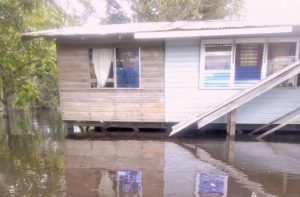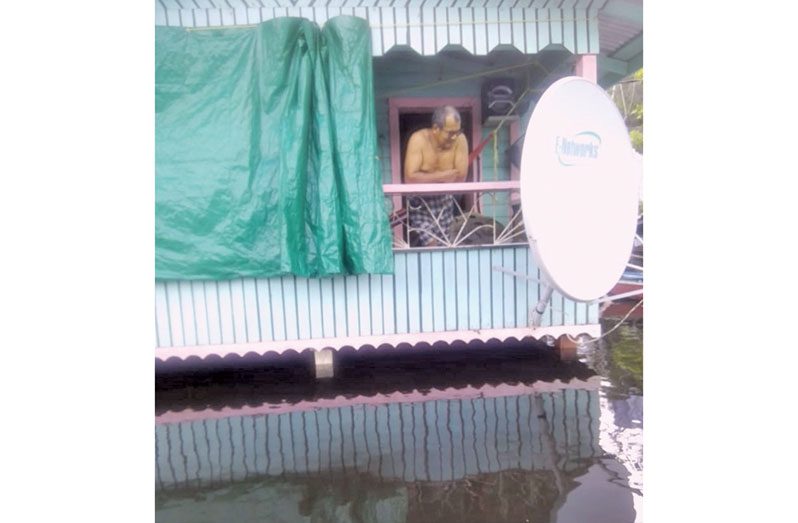RESIDENTS of Kwakwani, Region 10, (Upper Demerara- Upper Berbice) have raised several health concerns following the stagnant floodwaters that has taken over the community for almost two months now. Due to heavy rainfall and an overflow of the Berbice River, residents have been grappling with severe flooding since late April. Chairman of Region 10, Deron Adams, told the Guyana Chronicle, on Sunday, that while the water level in the community is slowly receding, residents are now reporting a ‘stench’ emanating from the water.
This, Adams said, has become worrisome for the regional authorities. “Our concern now is that we are getting a stench and we may likely start seeing dead animals and all kind of things floating up, so that is a major concern now.”
In response to the residents’ concerns, Adams said that the health department will have to mobilise teams of health professionals to sensitise residents on how to protect themselves from contracting water borne diseases.

Additionally, Adams said that the authorities will also have to conduct fogging exercises across flood- affected communities to limit the chances of having an outbreak.
“The Health Department will have to make an assessment and ensure that we have various health teams giving advice and spraying areas down so that persons will not be affected by diseases like leptospirosis and all the other things that comes with floods,” Adams said.
Yearly, when the May-June rainy season comes, residents of Kwakwani would brace themselves for torrential rainfall and light flooding. However, this year, water levels rose above 15 feet, displacing almost 100 persons from their respective homes.
Meanwhile, the Regional Health Officer, Dr. Gregory Harris, told the Guyana Chronicle that in preparation for the rainy season and expected floods, the Regional Health Committee held several sensitisation campaigns on how persons can protect themselves from flood-related diseases and infections.
However, earlier in the month, several cases of severe diarrohea were reported and since then the regional authorities have been monitoring people placed in shelters across the region and those who chose to remain at their respective homes despite the high-water levels.
“We have only had a few diarrohea cases here and there but nothing much, we usually have medical outreaches in all the flooded areas. So, when we go in, we would advise persons in terms of water treatment, how to store food and we would give them medication for rashes, the common cold and those kinds of things,” Dr. Harris said.
Additionally, concerns of the Coronavirus (COVID-19) pandemic are still present, especially now since the number of persons in shelters have increased over the past month.
According to Dr. Harris, while persons have been placed at strategic points in the various shelters to maintain social distancing, health officials have opted to conduct regular scheduled COVID-19 tests to monitor persons currently residing in shelters so as to avoid an outbreak.
“It’s just a routine thing because you have various persons going into the shelters, so we want to make sure that everybody is COVID free and if we should get a positive case, we can limit an outbreak, which we are trying to avoid,” Dr. Harris posited.



.jpg)










